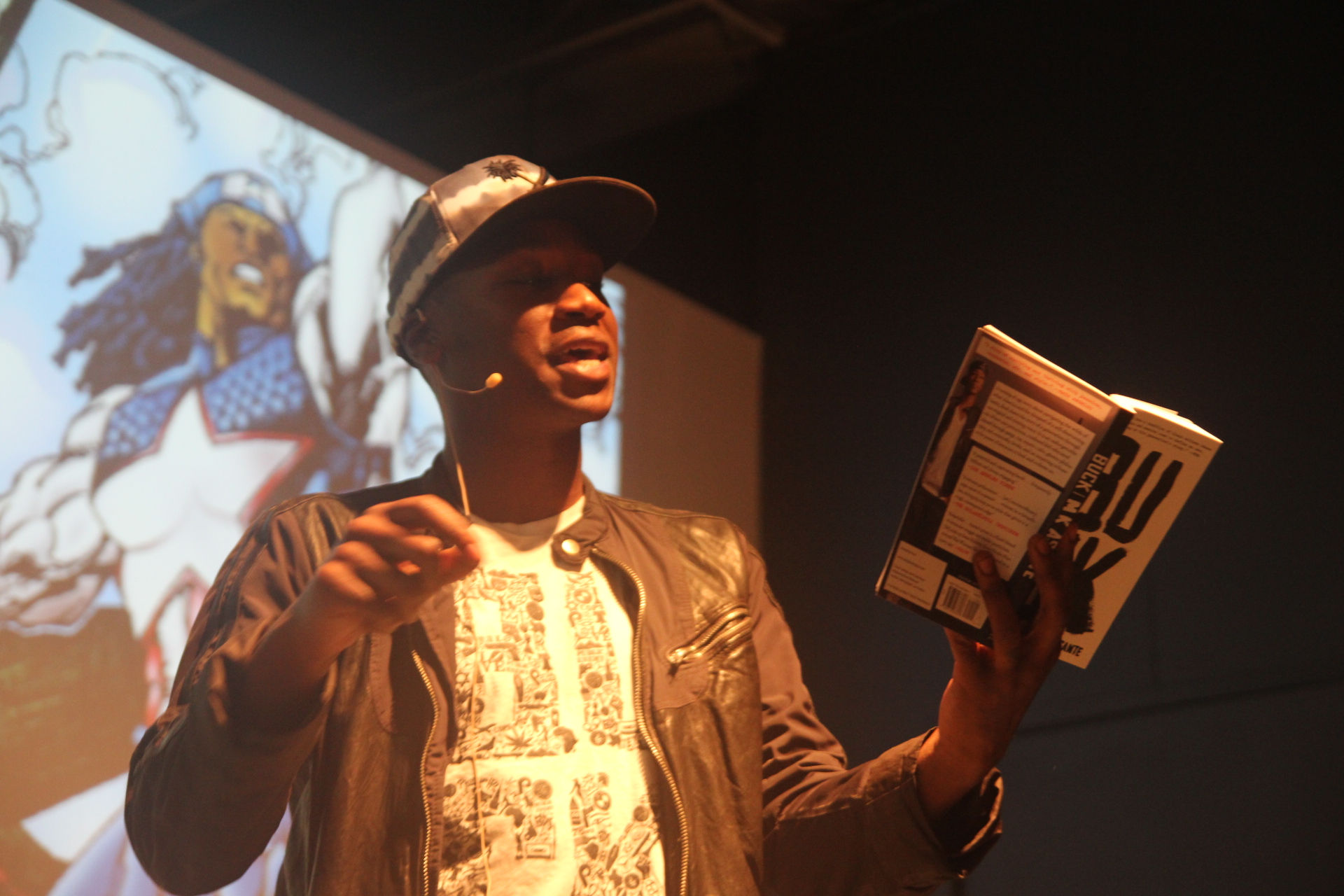For this blog post, author MK Asante speaks with Lorene Cary and young adults about safety, agency, and the power of language. MK Asante is a bestselling author, award-winning filmmaker, rapper, and professor. Called "the voice of a new generation" by Essence, Asante is the author of the acclaimed memoir Buck, described by Maya Angelou as "A story of surviving and thriving with passion, compassion, wit, and style."
This blog post was transcribed by Elizabeth Richardson from the event, which was organized by Safe Kids Stories at Slought.

MK Asante at Slought, 2015. Learn more »
In the book, I talk about my struggles at home, my family struggles. My brother was incarcerated, my mom had severe mental health issues, [and I had] a turbulent relationship with my father. I talk about getting kicked out of different schools, coming up, and all these challenges. But what I want to talk about the safety element. I want to talk about what saved me--I want to talk about the transformation.
I found myself at this alternative school, and this is when I got in trouble in schools, kicked out of schools, not really feeling education, or not feeling school. I don't think I knew what education was at the time, but I wasn't feeling school. So my mom finds a school that will take me.
I'm in this class one day, and the teacher puts a blank page in front of everybody and says, "Okay, class, now write." And the whole class starts scribbling fast like reporters in a press conference. I'm just chilling there, and then the teacher comes up [to me] and she says, "Write."
Now I'm kind of frustrated: "What do you want me to write?"
She says, "Anything you want," but immediately in my mind I felt she wasn't being genuine [. . ..] People say things like "write what you want." But when you really write what you want, it's not OK.
I wrote "Buck School" without the "B," and she looks at it. My whole plan was that she was going to see the curse and flip out and kick me out of class. And I would go back to G-Town, and that would be that. But instead, she saw it, and she said, "Keep going."
That's one of the huge transitional moments in my life--becoming a writer and liking to write. I would come to class early, and I'd be writing, and when I first started, the teacher said, "Oh, you kind of like this writing thing, huh?" I was like, "It's alright. You know, it's cool." I didn't want to be so enthusiastic yet. I wasn't comfortable--again, it's about safety. I didn't feel that vulnerability, I wasn't ready. I still had that shell, that tough exterior.
I continue to write, and then that leads to reading. I become a voracious reader because I feel like I missed out on all this time. Then I had another epiphany: I see why reading was illegal for black people during slavery. I always used to hear that and it never really meant anything to me, until I really started to think about the reality of reading being illegal. We subvocalize, we think in words. If you limit someone's vocabulary, you're not just limiting their vocab--you're limiting their thoughts. They can't even think of freedom, because they don't have the language to access that.
For me, this all became connected to my liberation; words became emancipatory. The more words I know, I say in the book, "my thoughts and my vocabulary grow together like the petals and stem of a flower." These things grow together, and all of a sudden, more words mean more options, more options mean more choices, more choices mean the ability to design my own reality and to be safe.
In so many ways, this book is a journey to safety, a journey to freedom, and to me freedom and safety are really synonymous. Freedom is safety. And that's why I [wrote in the book] about the analogy to the plantation. "Jawn"--it's the freedom to express ourselves. I found myself through language, through words, through writing, through reading.
"Buck Now" is about bucking the traps, bucking the stereotypes, setting your own path. It's about being a true rebel. Before, I was a rebel without a cause, without a purpose. It's about taking that rebellious spirit, that energy of youth, and putting it into something positive and bucking--being buck. We're redefining what buck is.
Learn more about Safe Kids Stories:
https://safekidsstories.com/
https://www.facebook.com/safekidsstories/
https://twitter.com/safekidsstories